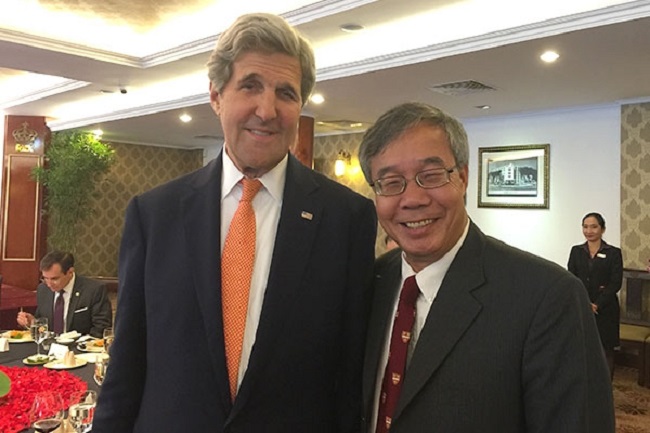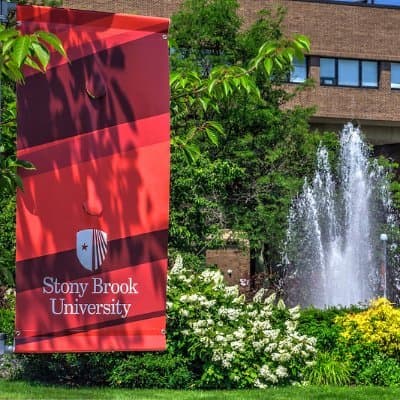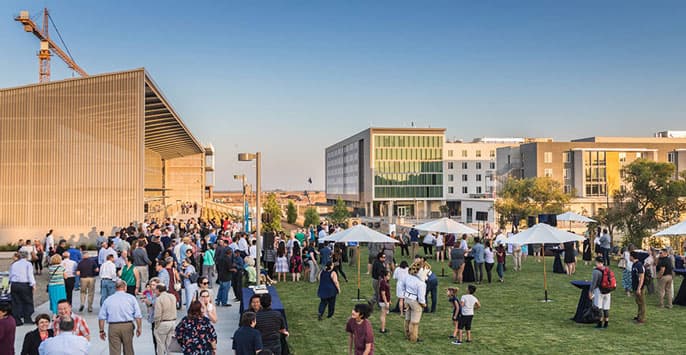“Educational Products Are People; If They Are Misguided, It Will Harm Society”
The Ministry of Education and Training has just announced a wide-ranging consultation on the draft law amending and supplementing several provisions of the Education Law and the Higher Education Law. However, in reality, over the years, the more it is amended, the more complicated it becomes! How to comprehensively amend the law to solve the most critical issues and move towards a humanistic and liberating education system remains a big question.
TheLEADER conducted a special report on education with the participation of Mr. Tran Duc Canh, discussing in-depth the most pressing issues in secondary and higher education today, true educational investment models, and more comprehensive critical feedback from both international and Vietnamese perspectives.

Mr. Tran Duc Canh (right) with former US Secretary of State John Kerry
Part 3: Developing Higher Education – Lessons from Practice
|
Mr. Tran Duc Canh was formerly the Director of Training and Human Resource Development for the state of Massachusetts (USA) and a member of the Northeast Regional University Council. He has also been an admissions advisor for Harvard University for many years. He was appointed by Prime Minister Nguyen Xuan Phuc to the National Education Council and Human Resource Development for the 2017 – 2021 term. |
Can you share some experiences about the Fulbright Scholarship program and the current Fulbright University?
Mr. Tran Duc Canh: The Fulbright Scholarship Program of the US government started in 1946, right after the end of World War II, proposed by Senator J. William Fulbright. The program aims to promote cultural, academic, and research exchanges between the US and other countries around the world.
Each year, more than 3,000 applicants receive Fulbright scholarships to study in the US, and in return, many American students, teachers, and researchers receive this scholarship to study and conduct research in other countries. This program has brought significant cultural, human, academic, and research value to the US and the world for over 70 years.
The Fulbright Scholarship Program came to Vietnam in the early 1990s when the US embargo against Vietnam was still in effect. My friends often had to take 3-4 flights to get to Vietnam to select candidates for this program.
The work in the early stages was quite challenging due to living conditions, transportation, security, and constant surveillance, but they had many interesting stories to tell when they returned. Gradually, everything opened up, understanding and empathy grew, and now receiving a Fulbright scholarship has become commonplace.
The story of the Fulbright Scholarship coming to Vietnam or other countries is quite similar, the vision of one person, Senator Fulbright, has changed the world.
The Fulbright Program in Ho Chi Minh City, in collaboration with the University of Economics, started in 1995 to train some public and private sector management professionals. The main management and teaching staff of the program were from the US. Some of the students who studied under the Fulbright Scholarship returned to teach.
After more than twenty years, this program has trained a workforce of public and private sector professionals, contributing significantly to social change. The core teaching staff has gradually been replaced by those who studied abroad.
I am very proud that the core teaching staff not only excelled in teaching but also participated in analyzing and critically discussing socio-economic issues professionally and deeply.
The idea of building a Vietnamese university following the American model began during the visit of the late Prime Minister Phan Van Khai to the US in 2005. At Mr. Khai’s request, the Harvard advisory group worked for many months.
The Fulbright University project has only begun to be implemented about four years ago and was officially licensed two years ago. The 2017-2018 academic year saw the recruitment and training of the first master’s class under the roof of Fulbright University; bachelor’s and master’s programs will open in the following years.
I and many others are quite surprised by how “hot” Fulbright University is in society today, even though it has not yet produced its first graduating class, largely due to the strong Fulbright brand in selecting and training over the years.
However, I think it is not wise to expect too much that Fulbright University will become the magic wand for higher education in Vietnam.
Do you have high hopes that the “seeds” will be multiplied from Fulbright? How do you assess the initial support from the US government and the potential contributions of benefactors later on to keep this university operating?
Mr. Tran Duc Canh: The essence of Fulbright University is that it is a non-profit university, meaning there are no shareholders, dividends, or personal ownership. All profits from the school’s operations are retained for reinvestment.
The Trust Fund organization in the US, consisting of passionate individuals who want to help Fulbright University develop, continues to support financial resources and build programs, investing in Fulbright University. The US government provides initial financial support, but in the long run, the school must balance its finances and seek funding from both domestic and international sources to develop.
Many people think that Fulbright University is an investment by the US government or an American university; both are incorrect. Financial support from the US government and efforts to facilitate the start of Fulbright University are crucial.
The Fulbright University project reflects positive diplomatic relations between the two governments. Fulbright University was established and operates under the Vietnamese Education Law, so the process of establishing and operating it has been more challenging than for a purely foreign school.
Fulbright is a Vietnamese university, built and managed according to the non-profit model, with a curriculum structured according to the American education model, encouraging flexibility in learning, diverse programs, and creativity. Although Fulbright University is still in its early stages, it will contribute to the Vietnamese higher education system in terms of organizational models, management, academic programs, and life skills training.
As someone passionate about education, are you worried when seeing big corporations investing in education? In your opinion, what qualities should educational investors have to create a sustainable educational environment for future generations?
Mr. Tran Duc Canh: Recently, some corporations have started investing in the education sector, and I think that’s a good sign. However, education has its own characteristics. Those working in education need not only passion but also a basic understanding, thinking, and orientation towards education and training. The product of education is people; if it goes wrong, it can be harmful to both individuals and society.
Years ago, I had the opportunity to approach several private universities in Vietnam, some of which were operational, while others were in the establishment phase. Most of the personnel involved can be divided into two main categories: those with money who want to invest in education, viewing education from a business perspective, and pure educators, who are less concerned with finance.
During operations, conflicts often arise, typically with the group with money winning because the majority shareholders decide. As a result, internal divisions occur, the quality of education is affected, leading to a decline in the school’s reputation.
In my opinion, investors do not necessarily need to be deeply involved in the school’s management. If they can select professional educational managers to run the school, the results will be better.
As a busy businessman with various jobs, why do you still spend a lot of time on education, advising each student individually to find the best school? What is your life philosophy that allows you to devote yourself to life?
Mr. Tran Duc Canh: Having the opportunity to help young people get into top US schools is very interesting to me. Instead of choosing a teaching career, I prefer talking to many young people and updating myself with new things.
In the US, I often interview or organize interviews with many candidates for Harvard University, advising and introducing candidates to schools. It is very satisfying to see a young person given the opportunity to fully realize their potential. On the contrary, it can be frustrating and annoying when things don’t go as hoped, as if it were my own experience.
From your personal experience, how has the educational environment you experienced brought about a significant change in your thinking? Can you share some valuable lessons for parents when sending their children to study abroad?
Mr. Tran Duc Canh: Many parents ask me if they should send their children to study abroad early, from 8th or 9th grade. The answer depends on the conditions, circumstances, and desires of each family, along with the student’s preparation.
Besides the ability to catch up with the curriculum when studying in the US, psychological stability while living away from home is equally important.
Fortunately, we are living in a technological era, where Facetime, Skype, or Viber can keep parents in daily contact with their children, to the point that many students don’t want their families to call too often, as it affects their studies and activities.
The case of Vietnamese students in the US today is similar to that of students from Taiwan, Hong Kong, Singapore, and South Korea in the 1970s and 80s that I know of. At that time, the economies of these countries were developing well, but many wealthy families were dissatisfied with the education system and sent their children to study in the US.
Not a few families sent their children to study at American high schools at the age of 14 or 15. Fortunately, American private high schools provide excellent boarding facilities and care for their students, but there are still cases where students suffer from severe depression and have to return home.
In my opinion, families and students should be well-prepared before deciding to study abroad. Normally, this preparation takes 1-2 years, including language proficiency, TOEFL, IELTS exams, academic assessment through SSAT or SAT, and psychological preparation for studying abroad.
If students are boarding at private schools, it’s simpler as the school arranges accommodation and study programs. In some cases, students stay with a host family, and if it’s an exchange program (1 year), the educational organization arranges it. In the case of self-funded study, the family must arrange it themselves.
There have been cases of staying with a host family leading to issues due to lack of transportation to school, unsuitable food, language barriers, or cultural misunderstandings, requiring a change of residence or school, and sometimes even returning home.
Some students stay with relatives while studying, which can also lead to cultural, emotional, and understanding conflicts. When such incidents occur, they can cause psychological shock for the student. The initial environment and communication in the US are crucial and can significantly affect the student’s long-term psychological well-being.
Do you hope that in the next 5-10 years, the model of studying at home will reduce the wave of educational, brain, and financial migration?
Mr. Tran Duc Canh: As mentioned above, currently developed countries in Asia, such as South Korea, Taiwan, and Hong Kong (China), have sent a large number of students to study in the US 4-5 decades ago, and they still continue to do so. Some seek job opportunities in the US or other countries after graduation, while others return home.
Both sources of “stay” and “return” during that period contributed significantly to their country’s later development. Vietnamese students may be in a different condition, but I still believe they will be a significant force contributing to the country’s development.
In an open world, working domestically or abroad is no longer an issue for those who are well-trained, specialized, and knowledgeable. The important thing is that they have an environment to thrive.
Currently, Vietnam has a large number of students studying abroad, not only in the US but also in other countries such as Australia, New Zealand, Canada, the UK… The total cost of studying abroad is very high, estimated at around 4 billion USD per year. With just half of this money, Vietnam could invest in building 8-10 quality schools (with advanced educational models) each year. After about 10 years, Vietnamese education would be vastly different.
At that time, studying abroad might not be necessary for most students, except for specific fields or research that are not available in Vietnamese schools. If educational investment is oriented towards the long-term development of the country, the force of students studying abroad is an extremely necessary and important resource.
Thank you!
Source: http://theleader.vn/san-pham-giao-duc-la-con-nguoi-neu-bi-sai-lech-se-nguy-hai-cho-xa-hoi-20180509063606432.htm

